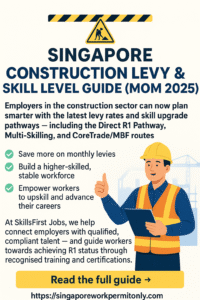The levy rate that employers pay for construction-sector Work Permit holders depends on the worker’s skill level — as classified by MOM.
🔹 Construction Levy Rates (2025)
| Skill Level | Qualification / Scheme | Typical Levy Range (per month) |
| Basic-Skilled (R2) | SEC(K) Basic Level | S$700 – S$900 |
| Higher-Skilled (R1) | Eligible via one of several upgrade pathways | S$300 – S$500 |
| Multi-Skilled (R1 Pathway) | Worker holds 2 or more trade certifications or equivalents | Lowest levy tier |
✅ Employers save more when hiring/upgrading R1 workers
✅ Workers gain better job security through upskilling
🎓 Understanding the Upgrade Pathways to “R1” Status
MOM & BCA recognize several routes for construction workers to qualify as Higher-Skilled (R1). Here are the major pathways:
1. Direct R1 Pathway
A worker can move into R1 status without going through the usual trade-experience route if they satisfy both:
- Hold a recognized technical or academic certificate, and
- Draw a fixed monthly salary of at least S$1,600.
Recognized Certificates Include:
- Diploma in Civil, Electrical or Mechanical Engineering
- NTC-2 / ITI Certificates in Construction Trades
- Polytechnic Diplomas or equivalent from approved local or overseas institutions
You can view the full list on the BCA “Recognised Qualifications for Direct R1 Pathway” page.
Important to Note:
- Passing SEC(K) alone — even at a higher grade — does not qualify for this pathway.
- Example scenarios:
| Scenario | R1 Eligible? | Pathway |
| Passed SEC(K) (Basic Level) | ❌ No | Remains R2 – Basic-Skilled |
| Passed SEC(K) (Higher Level) + 4 years’ experience + 2nd trade test | ✅ Yes | Multi-Skilling (see below) |
| Diploma in Civil Engineering (India) + S$1,600 salary | ✅ Yes | Direct R1 Pathway |
| SEC(K) (Basic Level) + S$1,600 salary only | ❌ No | Not eligible for Direct R1 |
2. Multi-Skilling Pathway
Here, a worker upgrades to R1 by acquiring two or more trade certifications (often via the trade test route) and achieving the required competency across multiple trades.
- Typical route: Worker starts as R2, gains first trade certification (SEC(K)), then takes a second trade test or certificate to become “multi-skilled”.
- Once multi-skilled, the levy rate drops accordingly (lowest R1 tier).
- This route emphasizes broadening the worker’s skill set across trades rather than relying on an academic certificate.
3. Core Trade / MBF (Man-Year Entitlement Waiver) Pathway
This pathway involves participation in recognized schemes under BCA’s upgrading framework:
- Core Trade: A competency-based registration scheme that encourages upgrading of skilled workers and firms.
- MBF (Man-Year Entitlement Waiver): A waiver scheme for firms meeting productivity and workforce upgrades.
- Employers who bring workers under these schemes may help those workers move into R1 classification.
- The key benefit: firms that commit to upgrading and productivity allow the workers to qualify for the lower R1 levy band.
🧭 Choosing the Right Pathway
- Direct R1 Pathway: Best suited for workers who already hold strong technical/academic credentials and meet the salary threshold.
- Multi-Skilling Pathway: Ideal for those who begin at trade-level and want to broaden into multiple trades.
- CoreTrade/MBF Pathway: Suitable for firms with structured upgrade programmes and for workers participating under those employer-led schemes.
💡 Why It Matters
- For Employers:
Hiring or upgrading workers to R1 status helps you enjoy lower monthly levies, a more skilled workforce, and may support your applications for productivity/upgrade incentives. - For Workers:
Upgrading to R1 brings faster renewal chances, better salary prospects, and a clearer career progression path in Singapore’s construction sector.
🧰 Skillsfirst Jobs — Connecting Skilled Workers & Employers
At Skillsfirst Jobs, we help employers build compliant, cost-efficient teams with qualified construction talent.
We also guide workers to upgrade their skills and qualify for R1 status through training, certifications, or participating in recognised pathways.
👉 Visit our portal: https://singaporeworkpermitonly.com
Find ready-to-hire construction candidates with verified skills, safety courses, and work permit details.

